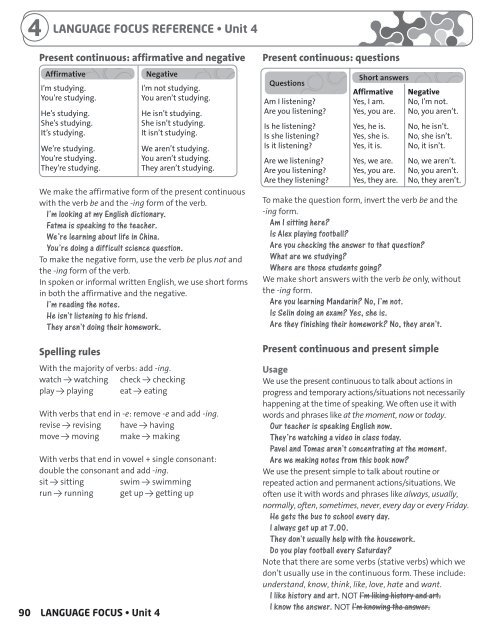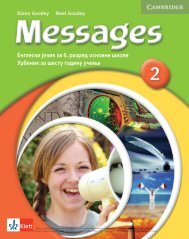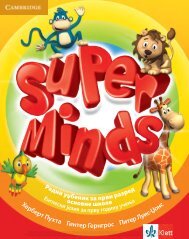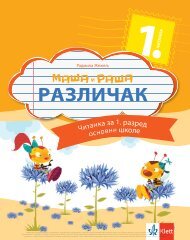Нови Логос, Еnglish plus 1, radna sveska
- No tags were found...
Create successful ePaper yourself
Turn your PDF publications into a flip-book with our unique Google optimized e-Paper software.
4<br />
LANGUAGE FOCUS REFERENCE • Unit 4<br />
Present continuous: affirmative and negative<br />
Affirmative<br />
I’m studying.<br />
You’re studying.<br />
He’s studying.<br />
She’s studying.<br />
It’s studying.<br />
We’re studying.<br />
You’re studying.<br />
They’re studying.<br />
We make the affirmative form of the present continuous<br />
with the verb be and the -ing form of the verb.<br />
I’m looking at my English dictionary.<br />
Fatma is speaking to the teacher.<br />
We’re learning about life in China.<br />
You’re doing a difficult science question.<br />
To make the negative form, use the verb be <strong>plus</strong> not and<br />
the -ing form of the verb.<br />
In spoken or informal written English, we use short forms<br />
in both the affirmative and the negative.<br />
I’m reading the notes.<br />
He isn’t listening to his friend.<br />
They aren’t doing their homework.<br />
Spelling rules<br />
With the majority of verbs: add -ing.<br />
watch → watching check → checking<br />
play → playing eat → eating<br />
With verbs that end in -e: remove -e and add -ing.<br />
revise → revising have → having<br />
move → moving make → making<br />
With verbs that end in vowel + single consonant:<br />
double the consonant and add -ing.<br />
sit → sitting swim → swimming<br />
run → running get up → getting up<br />
90 LANGUAGE FOCUS • Unit 4<br />
Negative<br />
I’m not studying.<br />
You aren’t studying.<br />
He isn’t studying.<br />
She isn’t studying.<br />
It isn’t studying.<br />
We aren’t studying.<br />
You aren’t studying.<br />
They aren’t studying.<br />
Present continuous: questions<br />
Questions<br />
Am I listening?<br />
Are you listening?<br />
Is he listening?<br />
Is she listening?<br />
Is it listening?<br />
Are we listening?<br />
Are you listening?<br />
Are they listening?<br />
Short answers<br />
Affirmative<br />
Yes, I am.<br />
Yes, you are.<br />
Yes, he is.<br />
Yes, she is.<br />
Yes, it is.<br />
Yes, we are.<br />
Yes, you are.<br />
Yes, they are.<br />
Negative<br />
No, I’m not.<br />
No, you aren’t.<br />
No, he isn’t.<br />
No, she isn’t.<br />
No, it isn’t.<br />
No, we aren’t.<br />
No, you aren’t.<br />
No, they aren’t.<br />
To make the question form, invert the verb be and the<br />
-ing form.<br />
Am I sitting here?<br />
Is Alex playing football?<br />
Are you checking the answer to that question?<br />
What are we studying?<br />
Where are those students going?<br />
We make short answers with the verb be only, without<br />
the -ing form.<br />
Are you learning Mandarin? No, I’m not.<br />
Is Selin doing an exam? Yes, she is.<br />
Are they finishing their homework? No, they aren’t.<br />
Present continuous and present simple<br />
Usage<br />
We use the present continuous to talk about actions in<br />
progress and temporary actions/situations not necessarily<br />
happening at the time of speaking. We often use it with<br />
words and phrases like at the moment, now or today.<br />
Our teacher is speaking English now.<br />
They’re watching a video in class today.<br />
Pavel and Tomas aren’t concentrating at the moment.<br />
Are we making notes from this book now?<br />
We use the present simple to talk about routine or<br />
repeated action and permanent actions/situations. We<br />
often use it with words and phrases like always, usually,<br />
normally, often, sometimes, never, every day or every Friday.<br />
He gets the bus to school every day.<br />
I always get up at 7.00.<br />
They don’t usually help with the housework.<br />
Do you play football every Saturday?<br />
Note that there are some verbs (stative verbs) which we<br />
don’t usually use in the continuous form. These include:<br />
understand, know, think, like, love, hate and want.<br />
I like history and art. NOT I’m liking history and art.<br />
I know the answer. NOT I’m knowing the answer.

















